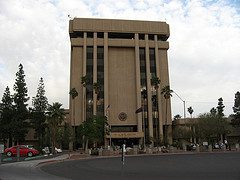In Arizona, the ever-shifting attempt to assign or avoid the pain of the foreclosure crisis has gone to court.
Arizona’s laws had previously said that lenders had no recourse if a homeowner walked away from an underwater residential mortgage—they got the collateral and ate the difference. In commercial properties, however, they were allowed to sue for the difference.
As the number of underwater mortgages kept rising, the bankers fought for and won legislation that would give some exceptions to this “no recourse” provision: It wouldn’t apply to unfinished construction, would only apply to one- and two-family homes, and would only apply after six months of owner-occupancy. In other words, they were trying to separate the homeowners from the speculators.
This provision was repealed in a special budget session, at the behest of the real estate industry, and the bankers are suing to overturn the repeal on procedural grounds.
The real estate industry’s arguments seem kind of weak to me (really? You want to include second homes in the no recourse provision?).
On the other hand, why do the lenders get recourse at all?
Isn’t the point of good underwriting to avoid that? To take a page from those who like to say we’re too soft on homeowners: If there wasn’t outright fraud involved, shouldn’t the lender eat the difference, investment property or no? They chose to accept that property as collateral. Isn’t that part of the risk inherent in their business? Unlike homeowners, they can’t claim to have not understood the fine print.
But in the end, I’ll take effect over theory. So what would be the effect of this legislation on attempts to stabilize communities? Is there a way to separate speculators from legit local landlords who have a few three- and four-unit properties that are underwater? Or folks who bought at the wrong time and didn’t hit six months of occupancy? What do you folks who are working on foreclosure prevention and recovery think would be the results of such provisions?
(Photo of Arizona Capitol Complex by Ken Lund, Creative Commons Share Alike)





Comments